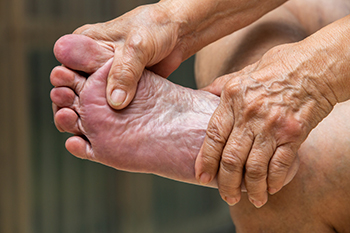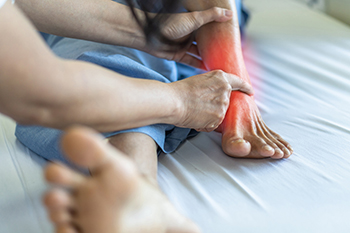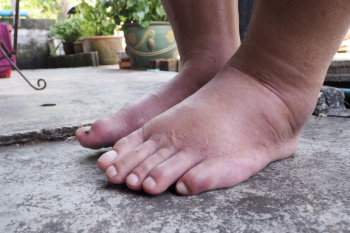Items filtered by date: June 2024
The Importance of Geriatrics
 Geriatrics is a branch of medicine focused on the health care of older adults. As people age, their bodies undergo various changes, making them more susceptible to certain health conditions, including foot and ankle problems. Geriatric podiatrists specialize in diagnosing and treating these issues, particularly arthritis, diabetic foot complications, and decreased circulation. Thinning skin and age-related foot deformities are also examined. Additionally, podiatrists provide comprehensive care to help seniors maintain mobility and an independent lifestyle. Regular foot exams by a geriatric podiatrist can help prevent falls, alleviate pain, and address any concerns related to foot health in older adults. If you or a loved one are experiencing foot problems associated with aging, scheduling a consultation with a geriatric podiatrist can be beneficial. By placing emphasis on preventive measures and early intervention, geriatric podiatrists will assist in advocating for healthy aging and enhanced quality of life among older adults. For guidance on foot problems related to aging, it is suggested that you consult a geriatric podiatrist for an effective approach to maintaining a vibrant lifestyle.
Geriatrics is a branch of medicine focused on the health care of older adults. As people age, their bodies undergo various changes, making them more susceptible to certain health conditions, including foot and ankle problems. Geriatric podiatrists specialize in diagnosing and treating these issues, particularly arthritis, diabetic foot complications, and decreased circulation. Thinning skin and age-related foot deformities are also examined. Additionally, podiatrists provide comprehensive care to help seniors maintain mobility and an independent lifestyle. Regular foot exams by a geriatric podiatrist can help prevent falls, alleviate pain, and address any concerns related to foot health in older adults. If you or a loved one are experiencing foot problems associated with aging, scheduling a consultation with a geriatric podiatrist can be beneficial. By placing emphasis on preventive measures and early intervention, geriatric podiatrists will assist in advocating for healthy aging and enhanced quality of life among older adults. For guidance on foot problems related to aging, it is suggested that you consult a geriatric podiatrist for an effective approach to maintaining a vibrant lifestyle.
If you need your feet checked, contact Howard Abramsohn, DPM of Ambulatory Foot and Ankle Associates, LLC. Our doctor will attend to all of your foot and ankle needs and provide you with quality treatment.
Geriatrics and Podiatry
When people age, some common issues that may occur are bone density loss, dry skin, poor circulation, and rough brittle nails. These issues may also affect your foot health if the necessary steps are not taken to alleviate the problems.
It is important to take care of your feet because feet that are injured or diseased can affect your overall health. Having painful feet hinders your ability to do daily activities or may decrease your willingness to do the things that you need to do.
Visiting Your Geriatrician
As we age, health problems become more likely, so it is essential to visit your doctor for check-ups to ensure that you are doing the best you can to take care of your health. It is recommended to check your feet frequently for any possible cuts, bruises, swelling, corns or any other irregularities.
Taking Care of Elderly Feet
Cracked or dry feet can be treated by applying moisturizer often. It is also important not to wear old socks because the older the sock is, the higher the possibility there will be that there is bacteria there. Wear fresh socks and make sure they fit properly.
Proper foot health means that you can have a more active lifestyle and you will not be bogged down by pain. Foot health also leads to good circulation, which is paramount for overall health.
If you have any questions, please feel free to contact our office located in Mt Laurel Township, NJ . We offer the newest diagnostic tools and technology to treat your foot and ankle needs.
Symptoms and Causes of Ankle Bursitis

Ankle bursitis occurs when the bursae sacs in the ankle become inflamed, causing significant discomfort and mobility issues. Bursae are small, fluid-filled sacs that act as cushions between bones, tendons, and muscles, reducing friction and facilitating smooth joint movement. These sacs can become irritated or inflamed, typically due to overuse, trauma, infection, or medical conditions like gout or rheumatoid arthritis. Common symptoms of ankle bursitis include pain and tenderness in the ankle, swelling, stiffness, warmth, or redness around the affected area. Aching or throbbing pain also can occur, especially when pressure is applied. Overuse from activities like running or dancing, trauma from injuries, or wearing poorly fitting shoes are frequent causes. Proper diagnosis may include imaging tests like X-rays or MRIs to rule out other conditions. In some cases, fluid from the bursae might be tested for infections. If you're experiencing symptoms of ankle bursitis, it is suggested that you make an appointment with a podiatrist for a diagnosis and treatment.
Ankle pain can be caused by a number of problems and may be potentially serious. If you have ankle pain, consult with Howard Abramsohn, DPM from Ambulatory Foot and Ankle Associates, LLC. Our doctor will assess your condition and provide you with quality foot and ankle treatment.
Ankle pain is any condition that causes pain in the ankle. Due to the fact that the ankle consists of tendons, muscles, bones, and ligaments, ankle pain can come from a number of different conditions.
Causes
The most common causes of ankle pain include:
- Types of arthritis (rheumatoid, osteoarthritis, and gout)
- Ankle sprains
- Broken ankles
- Achilles tendonitis
- Achilles tendon rupture
- Stress fractures
- Bursitis
- Tarsal tunnel syndrome
- Plantar fasciitis
Symptoms
Symptoms of ankle injury vary based upon the condition. Pain may include general pain and discomfort, swelling, aching, redness, bruising, burning or stabbing sensations, and/or loss of sensation.
Diagnosis
Due to the wide variety of potential causes of ankle pain, podiatrists will utilize a number of different methods to properly diagnose ankle pain. This can include asking for personal and family medical histories and of any recent injuries. Further diagnosis may include sensation tests, a physical examination, and potentially x-rays or other imaging tests.
Treatment
Just as the range of causes varies widely, so do treatments. Some more common treatments are rest, ice packs, keeping pressure off the foot, orthotics and braces, medication for inflammation and pain, and surgery.
If you have any questions please feel free to contact our office located in Mt Laurel Township, NJ . We offer the newest diagnostic tools and technology to treat your foot and ankle needs.
Choosing the Right Running Shoes
 Selecting the right running shoes is important for both performance and injury prevention. Good running shoes should provide adequate support, cushioning, stability, and proper fit. Look for shoes that match your foot type, whether you have flat feet, high arches, or neutral arches. Additionally, consider the terrain you will be running on and choose shoes with appropriate traction and durability. When buying running shoes, try them on in the afternoon when your feet are slightly swollen, ensuring a proper fit. Leave about a thumb's width between your longest toe and the end of the shoe. Transition gradually from old to new shoes to allow your feet to adjust to the differences in support and cushioning. If you are looking for well-fitting running shoes, it is suggested that you visit a podiatrist for personalized guidance on selecting shoes and to address any specific foot concerns. This foot doctor can assess your gait, foot structure, and biomechanics to recommend the most suitable shoes for your needs, helping you enjoy a safe and comfortable running experience.
Selecting the right running shoes is important for both performance and injury prevention. Good running shoes should provide adequate support, cushioning, stability, and proper fit. Look for shoes that match your foot type, whether you have flat feet, high arches, or neutral arches. Additionally, consider the terrain you will be running on and choose shoes with appropriate traction and durability. When buying running shoes, try them on in the afternoon when your feet are slightly swollen, ensuring a proper fit. Leave about a thumb's width between your longest toe and the end of the shoe. Transition gradually from old to new shoes to allow your feet to adjust to the differences in support and cushioning. If you are looking for well-fitting running shoes, it is suggested that you visit a podiatrist for personalized guidance on selecting shoes and to address any specific foot concerns. This foot doctor can assess your gait, foot structure, and biomechanics to recommend the most suitable shoes for your needs, helping you enjoy a safe and comfortable running experience.
If you are a runner, wearing the right running shoe is essential. For more information, contact Howard Abramsohn, DPM from Ambulatory Foot and Ankle Associates, LLC. Our doctor can provide the care you need to keep you pain-free and on your feet.
Choosing the Right Running Shoe for Your Foot Type
To increase performance and avoid the risk of injury, it is important to choose the right running shoe based on your foot type. The general design of running shoes revolves around pronation, which is how the ankle rolls from outside to inside when the foot strikes the ground.
- Neutral runners are able to choose from a wide variety of shoes, including minimalist shoes or even going barefoot.
- Runners who overpronate, or experience an over-abundance of ankle rolling, should choose shoes that provide extra motion control and stability.
- Runners who underpronate, or supinate, have feet that have high arches and lack flexibility, preventing shock absorption. They require shoes with more flexibility and cushion.
If you have any questions, please feel free to contact our office located in Mt Laurel Township, NJ . We offer the newest diagnostic and treatment technologies for all your foot care needs.
Let the Expert Treat Your Ingrown Toenails
The Connection Between Swollen Feet and Heart Failure

Heart failure presents a complex web of symptoms, one of the most visible being swollen feet. This swelling, known as edema, stems from the heart's inability to effectively circulate blood throughout the body. As the heart weakens, blood flow slows, causing fluid to accumulate in the lower extremities due to gravity's pull. This edema is not just uncomfortable, it serves as a crucial indicator of worsening heart failure. Recognizing this connection is vital for timely intervention and management. Here, the role of a podiatrist, a specialized foot care professional, becomes paramount. Podiatrists can assess the severity of swelling, provide guidance on managing edema, and offer treatments to alleviate discomfort. They work in tandem with cardiologists and other healthcare providers to address the broader implications of swollen feet in heart patients. If you have swollen feet, it is suggested that you schedule an appointment with a podiatrist who can provide you with a diagnosis and treatment options.
Swollen feet can be a sign of an underlying condition. If you have any concerns, contact Howard Abramsohn, DPM of Ambulatory Foot and Ankle Associates, LLC. Our doctor can provide the care you need to keep you pain-free and on your feet.
Swollen feet are a common ailment among pregnant women and people who stand or sit for extended periods. Aging may increase the possibility of swollen feet and patients who are obese often notice when their feet are swelling too. There may be medical reasons why swollen feet occur:
- Phlebitis - A condition that causes the veins to become inflamed and can also cause leg pain.
- Liver disease - This may lead to low blood levels of albumin which is a protein. This can cause fluid in the blood to pass into the tissues and several areas of the body can become swollen.
- Heart failure - When the heart doesn’t pump properly the blood that is normally pumped back to the heart can pool in the veins of the legs causing swollen feet.
- Kidney disease - One of the main functions of the kidneys is releasing excess fluid in the body. This type of condition can make it difficult for the kidneys to function properly, and as a result the feet may become swollen.
- Deep-vein thrombosis (DVT)- This is a serious condition where blood clots form in the veins of the legs. They can block the return of blood from the legs to the heart which may cause the feet to swell. It is important to be treated by a podiatrist if this condition is present.
Swollen feet can also be caused by bone and tendon conditions, including fractures, arthritis, and tendinitis. Additionally, there may be skin and toenail conditions and an infection may cause the feet to swell. Patients who take medicine to treat high blood pressure may be prone to getting swollen feet.
Many patients elevate their feet to help relieve the swelling and this is generally a temporary remedy. When a podiatrist is consulted the reason behind the swelling can be uncovered and subsequently treated.
If you have any questions please feel free to contact our office located in Mt Laurel Township, NJ . We offer the newest diagnostic tools and technology to treat your foot and ankle needs.

